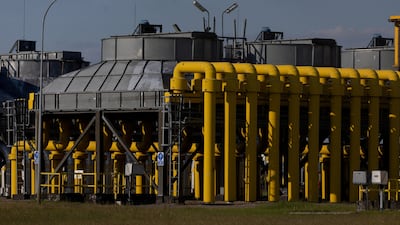Oil prices settled higher on Friday, with the market largely supported by the possibility of Russia cutting oil and gas exports to Europe, but still ended the week down after days of volatile trading.
Brent, the benchmark for two thirds of the world's oil, climbed 4.14 per cent, to settle at $92.84 a barrel. West Texas Intermediate, the gauge that tracks US crude, closed up 3.89 per cent, to close at $86.79 a barrel.
However, despite strong performance on Friday, crude prices recorded their second straight weekly decline as demand outlook weakened amid aggressive interest rate increases by central banks and China's continuing restrictions to curb the spread of Covid-19.
“Oil prices continued to rebound with sentiment improving and supply cuts becoming a concern after Russia threatened to cut deliveries to Europe. At the same time, crude could see some selling pressure, with China’s economy slowing down,” said Farah Mourad, senior market analyst at broker XTB Mena.
The benchmarks Brent nd WTI fell by about 5 per cent and 6 per cent, respectively, on Wednesday, but swung to gains on Thursday after Russian President Vladimir Putin said his country would not supply energy to countries that back a price cap on Moscow's crude proposed by the US and Europe in response to the military offensive in Ukraine.
Russia is the world's second-largest oil exporter after Saudi Arabia and the world's top natural gas exporter. Before the war in Ukraine, Europe was importing about 40 per cent of its gas and 30 per cent of its oil from Russia.
Moscow also warned the West on Friday that their capping plans would fail and ultimately lead to the instability of the US and its allies.
Russia “will fulfil the contracts but will not supply oil, gas, or coal to its own detriment”, he said.
“Over the coming months, the West will have to contend with the risk of losing Russian energy supplies and oil prices soaring,” said Stephen Brennock, an analyst at broker PVM Oil Associates.
Brent crude has lost about a third of its value since it touched highs of $147 per barrel in March after Russia began its military assault in Ukraine. Trading has remained volatile as fears of a looming recession grew and amid demand outlook concerns.
Lockdowns across China, the world's second-biggest oil consumer, has been a nagging concern for energy markets. Beijing reported in July that the country's economy grew at its slowest pace since the initial coronavirus outbreak in Wuhan.
More than 40 central banks globally have raised interest rates and need to continue increasing their benchmark rates in an attempt to tame inflation that is stoking fears of a recession.
The US Federal Reserve delivered another 75 basis point rate increase at its July meeting, bringing the total increase in the Fed Funds rate to 225 basis points since March.
On Thursday, the European Central Bank increased its rates by an unprecedented 75 bps, and said it expects to raise rates further as “inflation remains far too high and is likely to stay above target for an extended period”.
However, the US Energy Information Administration in its short-term outlook said that global oil demand growth could increase by an average of 2.1 million barrels per day throughout 2022 and by an average of 2 million bpd in 2023.
It estimates that 99.4 million bpd of petroleum and liquid fuels were consumed globally in August 2022, up by 1.6 million bpd from August 2021.
“As a result of high natural gas prices globally, we increased our forecast for oil consumption in the fourth quarter of 2022 and the first quarter of 2023 as electricity providers, particularly in Europe, may switch to oil-based generating fuels,” the EIA said.


